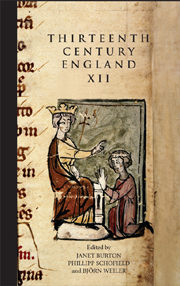Book contents
- Frontmatter
- Contents
- PREFACE
- LIST OF CONTRIBUTORS
- LIST OF ABBREVIATIONS
- The English and the Welsh in Fouke le Fitz Waryn
- Royal Piety in Thirteenth-century Scotland: The Religion and Religiosity of Alexander II (1214–49) and Alexander III (1249–86)
- The 1213 Pipe Roll and Exchequer Authority at the End of John's Reign
- The Public Debate during the Baronial Rebellion
- Richard of Cornwall and the Baronial Opposition in 1263
- Les liens personnels entre les cours de France et d'Angleterre sous le règne de Philippe III, 1270–85
- The Lay Opposition to Edward I in 1297: Its Composition and Character
- Peacekeepers and Lawbreakers in London, 1276–1321
- ‘The peace less kept’? The Origins, Revelations and Impact of Edward I's ‘Trailbaston’ Commissions of 1305–7
- Notes and Documents
Royal Piety in Thirteenth-century Scotland: The Religion and Religiosity of Alexander II (1214–49) and Alexander III (1249–86)
Published online by Cambridge University Press: 12 September 2012
- Frontmatter
- Contents
- PREFACE
- LIST OF CONTRIBUTORS
- LIST OF ABBREVIATIONS
- The English and the Welsh in Fouke le Fitz Waryn
- Royal Piety in Thirteenth-century Scotland: The Religion and Religiosity of Alexander II (1214–49) and Alexander III (1249–86)
- The 1213 Pipe Roll and Exchequer Authority at the End of John's Reign
- The Public Debate during the Baronial Rebellion
- Richard of Cornwall and the Baronial Opposition in 1263
- Les liens personnels entre les cours de France et d'Angleterre sous le règne de Philippe III, 1270–85
- The Lay Opposition to Edward I in 1297: Its Composition and Character
- Peacekeepers and Lawbreakers in London, 1276–1321
- ‘The peace less kept’? The Origins, Revelations and Impact of Edward I's ‘Trailbaston’ Commissions of 1305–7
- Notes and Documents
Summary
It is perhaps inevitable that the public and personal piety of Scotland's thirteenth-century kings should appear unremarkable in contrast to that of the long-reigning Henry III of England and Louis IX of France. Henry's consuming investment at Westminster Abbey in the cult of his ancestor, Edward the Confessor, and, from 1247, the veneration at that house of a Holy Blood relic, were but the most outward signs of a deep personal faith wedded tightly to Plantagenet political ends. A number of recent studies have revealed in Henry a commitment to a varied and costly round of religious building as well as regular observances through masses, alms-giving and ritual commemoration. Many of these practices were continued by Henry's son: Edward I's rule can also be shown to reflect a strong personal as well as heavily politicised faith. Nonetheless, the reputations of both these English monarchs have struggled to compete with that of the ‘most Christian’ French king. Louis was a charismatic religious exemplar, canonised in 1297, but during his lifetime already praised throughout Europe for his charity, devotion to his royal predecessors at St Denis, veneration of both local and universal saints and their newly translated relics and, of course, his firm will actually to crusade.
Little wonder, then, that the successive Kings Alexander of Scotland seem, at best – to use a well-worn measure – largely ‘conventional’ in their religious politics and patronage as well as in their religiosity as individuals; or, at worst, they are really ‘unknowable’ as spiritual beings.
- Type
- Chapter
- Information
- Thirteenth Century England XIIProceedings of the Gregynog Conference, 2007, pp. 13 - 30Publisher: Boydell & BrewerPrint publication year: 2009



